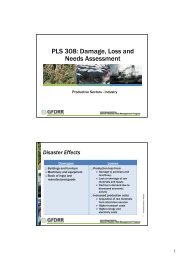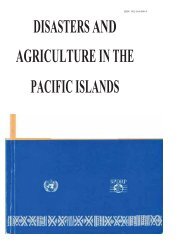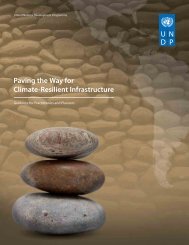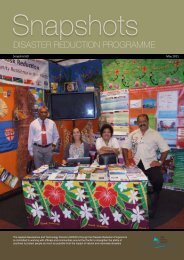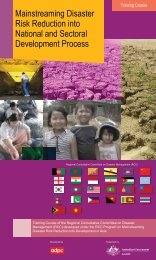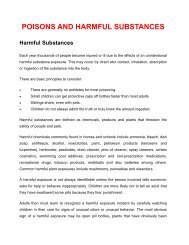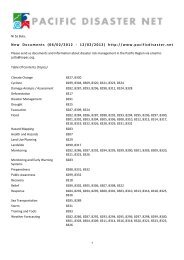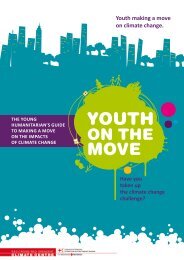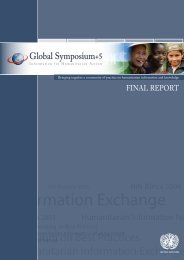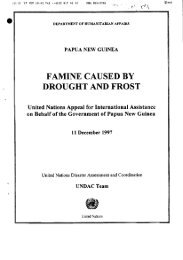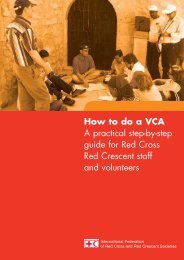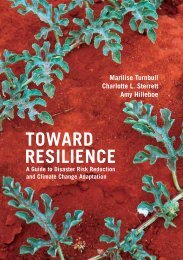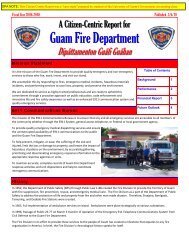A global review of disaster reduction initiatives - Welcome to the ...
A global review of disaster reduction initiatives - Welcome to the ...
A global review of disaster reduction initiatives - Welcome to the ...
You also want an ePaper? Increase the reach of your titles
YUMPU automatically turns print PDFs into web optimized ePapers that Google loves.
nication remains <strong>the</strong> local language radio network<strong>of</strong> Radio Mozambique. This servicebroadcasts information regularly about preventionand <strong>disaster</strong> risk <strong>reduction</strong> measures, aswell as communicating warning alerts at <strong>the</strong>time <strong>of</strong> imminent hazards. INGC has alsoworked with <strong>the</strong> World Food Program <strong>to</strong> conducttraining seminars for journalists in order<strong>to</strong> improve <strong>the</strong> quality <strong>of</strong> reporting, and anannual prize has been proposed for <strong>the</strong> best<strong>disaster</strong> reporting.Local community experiencepromotes public awarenessSome <strong>of</strong> <strong>the</strong> most effective means <strong>of</strong> publicawareness can take place at <strong>the</strong> local communitylevel with <strong>the</strong> added advantage <strong>of</strong> involving<strong>the</strong> participation <strong>of</strong> a cross-section <strong>of</strong> <strong>the</strong> localpopulation.The Community Action Group for Floodwaterin <strong>the</strong> Old Community <strong>of</strong> Rodenkirchen(Bürgerinitiative Hochwasser, AltgemeindeRodenkirchen) is a non-pr<strong>of</strong>it associationfounded in a district <strong>of</strong> Cologne, Germany,after <strong>the</strong> severe flooding <strong>of</strong> <strong>the</strong> Rhine River in1993 and 1995. This group advocates <strong>the</strong>interests <strong>of</strong> more than 4,000 residents in matters<strong>of</strong> local flood protection. In 2001, <strong>the</strong> communityaction group sailed <strong>the</strong> boat Pegellatte("Water Depth Gauge") up <strong>the</strong> Rhine fromCologne <strong>to</strong> Basle, Switzerland staging eventsand conducting discussions in 18 <strong>to</strong>wns andcities <strong>to</strong>ge<strong>the</strong>r with o<strong>the</strong>r community actiongroups and representatives <strong>of</strong> local authorities.In 2002 <strong>the</strong> group will take <strong>the</strong>ir floodwatercampaign boat downstream from Cologne <strong>to</strong><strong>the</strong> Rhine delta. The overall promotionalefforts <strong>of</strong> <strong>the</strong> campaign for greater awarenessabout flood issues is not limited <strong>to</strong> Germanyalone, as <strong>the</strong> Group's trips also go throughparts <strong>of</strong> France, Switzerland and <strong>the</strong> Ne<strong>the</strong>rlands.As a Burgerinitiative Hochwasserspokesman says emphatically, "The aim is <strong>to</strong>win over <strong>the</strong> solidarity <strong>of</strong> ALL Rhine Riverresidents, because we can only combat flooding<strong>to</strong>ge<strong>the</strong>r". In fulfilling <strong>the</strong>ir own vow, <strong>the</strong> communityaction group cooperates closely with<strong>the</strong> German Committee for Disaster Reduction(Deutsches Komitee für Katastrophenvorsorge)and <strong>the</strong> Rhine Emergency FloodwaterOrganisation (HochwassernotgemeinschaftRhein).Building understanding: development <strong>of</strong> knowledge and information sharingA number <strong>of</strong> public awareness projects are currentlyunderway in South Africa covering avariety <strong>of</strong> communities at risk. Ukuvuka:Operation Fires<strong>to</strong>p aims <strong>to</strong> reduce <strong>the</strong> riskfrom wildfires in <strong>the</strong> Cape Peninsula. Thecampaign was launched in <strong>the</strong> Western CapeProvince in February 2000 after fires thatburned land along Table Mountain behindCape Town. The Ukuvuka Campaign has afour-year mandate <strong>to</strong> achieve its goals <strong>of</strong> transferringlessons learned about effective conservationmeasures and biodiversity linked <strong>to</strong>social engagement, and how those methods canbe passed on <strong>to</strong> o<strong>the</strong>r communities.In Operation Fires<strong>to</strong>p, <strong>the</strong> primary objective is<strong>to</strong> protect <strong>the</strong> land and vegetation by controllingalien plant species and by rehabilitating<strong>the</strong> fire-damaged areas <strong>the</strong>y <strong>of</strong>ten inhabit. Arelated aim is <strong>to</strong> help people and <strong>the</strong>ir communitiescreate employment through training andpoverty relief for disadvantaged people by protecting<strong>the</strong> most vulnerable communities fromfire and promoting co-operation and socialcohesion among <strong>the</strong>m. A third goal is <strong>to</strong> assistin <strong>the</strong> implementation <strong>of</strong> integrated fire managementplans, particularly in areas close <strong>to</strong>urban centres.Elsewhere in South Africa, o<strong>the</strong>r public awarenesscampaigns about <strong>disaster</strong>s are also underway.The Tshwane Metropolitan Councilembarked on a campaign within urban communitieson a variety <strong>of</strong> local risks includinginformal settlement fires, <strong>the</strong> spread <strong>of</strong> diseases,floods, extreme wea<strong>the</strong>r conditions, pollutionand HIV/AIDS.The Western and Eastern Cape Provincesjointly implemented an innovative I-SPYawareness campaign. This program involved<strong>the</strong> distribution <strong>of</strong> information boxes, whichwere small cubes with circular magnifyinglenses placed in two <strong>of</strong> <strong>the</strong> sides. Informationabout community hazards and means <strong>to</strong> reducerisks could be seen by peering through <strong>the</strong>glass that enlarged <strong>the</strong> information printed on<strong>the</strong> inside <strong>of</strong> <strong>the</strong> box. As <strong>the</strong> information wasdepicted in pictures, <strong>the</strong> messages were able <strong>to</strong>cross language barriers.The disastrous events <strong>of</strong> recent years haveshown that a large part <strong>of</strong> <strong>the</strong> Latin Americanand <strong>the</strong> Caribbean population, particularlypeople living in rural areas, remain largely1974



